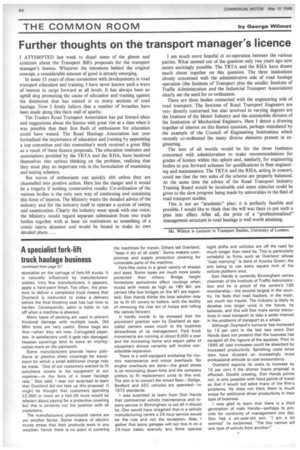THE COMMON ROOM by George Wilmot
Page 66

If you've noticed an error in this article please click here to report it so we can fix it.
Further thoughts on the transport manager's licence
I ATTEMPTED last week to dispel some of the gloom and cynicism about the Transport Bill's proposals for the transport manager's licence. Whatever the intentions behind the original concept, a considerable amount of good is already emerging.
In some 15 years of close connection with developments in road transport education and training, I have never known such a wave of interest to surge forward at all levels. It has always been an uphill slog promoting the cause of education and training against the disinterest that has existed in so many sections of road haulage. Now I firmly believe that a number of breaches have been made along this thick wall of apathy.
The Traders Road Transport Association has put foward ideas and suggestions about the licence with great vim at a time when it was possible that their first flush of enthusiasm for education could have waned. The Road Haulage Association last year formalized the importance of education and training by appointing a top committee and this committee's work received a great fillip as a result of these licence proposals. The education institutes and associations prodded by the TRTA and the RHA, have bestirred themselves into serious thinking on the problem, realizing that they must play an important role in the formulation of examining and testing schemes.
But waves of enthusiasm can quickly ebb unless they are channelled into positive action. Here lies the danger and it would be a tragedy if nothing constructive results. Co-ordination of the various bodies is the only sure way of continuing and sustaining this force of interest. The Ministry wants the detailed advice of the industry and for the industry itself to operate a system of testing and examination. Clearly the industry must speak with one voice; the Ministry would regard separate submission from two trade bodies together with at least six institutions as something of a comic opera situation and would be bound to make its own detailed plans.... I am much more hopeful of co-operation between the various parties. What seemed out of the question only two years ago now seems excitingly possible. The TRTA and the RHA have drawn much closer together on this question. The three institutions closely concerned with the administrative side of road haulage operation (the Institute of Transport plus the smaller Institute of Traffic Administration and the Industrial Transport Association) clearly see the need for co-ordination.
There are three bodies connected with the engineering side of road transport. The Institute of Road Transport Engineers are very directly concerned but also involved in varying degrees are the Institute of the Motor Industry and the automobile division of the Institution of Mechanical Engineers. Here I detect a drawing together of interest on this licence question, perhaps stimulated by the example of the Council of Engineering Institutions which recently co-ordinated the many diverse elements present in engineering.
The best of all worlds would be for the three Institutes concerned with administration to make recommendations for grades of licence within this sphere and, similarly, for engineering bodies to put forward schemes for qualifications in fleet engineering and maintenance. The TRTA and the RHA, acting in concert, could see that the two sides of the scheme are properly balanced. At the same time the advice of the Road Transport Industry Training Board would be invaluable and some stimulus could be given to the slow progress being made by universities in the field of road transport studies.
This is not an "academic" plan; it is perfectly feasible and possible. I would like to think that the will was there to put such a plan into effect. After all, the prize of a "professionalized" management structure in road haulage is well worth attaining.
Mr. Wilmot is Lecturer in Transport Studies, University of London.












































































































